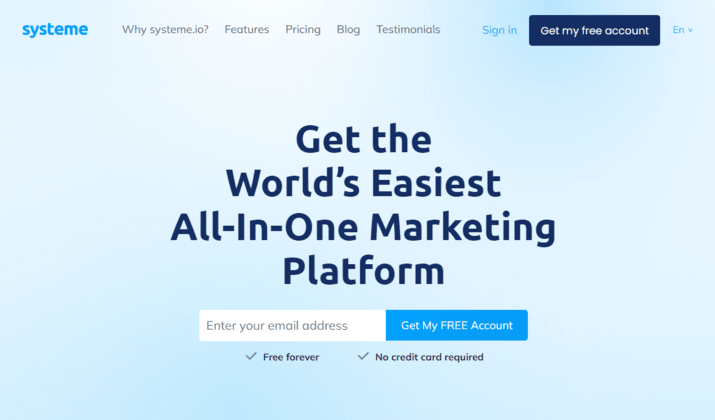Two of the most popular and widely used marketing platforms are Systeme and Simvoly.
Systeme.io is an all-in-one marketing platform designed to assist entrepreneurs in running their businesses efficiently.
It offers a range of features that cater to various needs, making it a comprehensive solution for small business owners and marketers.
Mainly known for its website building, funnel building, and ecommerce capabilities, Simvoly offers powerful marketing tools that help users grow their online businesses effectively.
Both the tools have their pros and cons and this is what we are going to discuss in this article. By the end of it, you would be in a better position to decide which platform suits your needs.
Let’s find out more.
Check Out: Systeme.io vs Beehiiv – Which is Right for You?
Systeme.io vs Simvoly – Features
Systeme.io
Systeme.io offers a host of marketing features. From email marketing to workflow management, Systeme.io has it all in its armoury.
- Sales Funnel Builder: Systeme.io provides a user-friendly interface for creating sales funnels, which are essential for guiding potential customers through the buying process.
- Email Campaign Creator: The platform offers tools for creating and managing email campaigns, a crucial aspect of digital marketing to engage with leads and customers effectively.
- Blogging Tool: Users can build and manage blogs directly on Systeme.io, allowing them to create content and engage with their audience through this platform.
- Course Creation: Systeme.io enables users to create and manage online courses, making it a valuable tool for those looking to offer educational content or training programs.
- Affiliate Program Management: The platform includes an affiliate management system, allowing users to expand their marketing reach by recruiting, managing, and tracking affiliates.
- Workflow Management: Systeme.io offers workflow management features to streamline processes and improve efficiency in running online businesses.
- Custom Domains: Users can set up custom domains on Systeme.io, providing a professional and branded online presence.
These features make Systeme.io a versatile and user-friendly platform that caters to the needs of entrepreneurs, offering tools for sales, marketing, content creation, and more in one integrated package.
Check Out: Stan store vs Systeme.io
Simvoly
Simvoly aims to provide an all-encompassing solution for online businesses, offering tools for website building, e-commerce, email marketing, funnels, CRM, memberships, and appointment bookings in one integrated platform.
Take a look at some of its top features:
- Drag & Drop Builder: Simvoly provides a smooth drag-and-drop page builder that allows users to organize content in blocks, rows, and columns, making it easy to create unique and visually appealing pages.
- Templates: The platform offers perfectly crafted templates for various sections, enabling users to build pages quickly with stunning designs. Users can choose from hundreds of page designs and customize them to suit their needs.
- E-commerce Capabilities: Simvoly supports digital, physical, services, and memberships sales without transaction fees. Users can fully customize the checkout experience, set up product variations, create promo codes, manage customer profiles, and more to enhance their online sales.
- Email Marketing: Simvoly includes a built-in email marketing platform that allows users to create and send email campaigns, segment subscribers, build automations, and track campaign performance. The platform ensures that emails are mobile-responsive and look great on all devices.
- Funnel Builder: Simvoly offers a powerful funnel builder with features like one-click upsells, downsells, order bumps, and split testing. Users can create sales funnels to optimize conversions and increase revenue.
- CRM and Memberships: The platform provides CRM functionalities to manage customer relationships effectively. Users can create membership groups, manage members, and track interactions to enhance customer engagement.
- Appointment Booking: Simvoly allows users to create events and appointment operators, set availability, and offer various services with different information and durations. This feature enables users to schedule one-on-one appointments with their clients seamlessly.
Interesting Read: Brevo vs Systeme.io – Which is Right for You?
Systeme.io vs Simvoly – Limitations
Systeme.io
Despite all its goodness, Systeme.io is not perfect. It has certain limitations that it needs to work on.
The cons of using Systeme.io include:
- Limited Design Flexibility: Users may find it challenging to customize and personalize pages from scratch due to the platform’s limited design flexibility
- Few Third-Party Integrations: Systeme.io does not offer many third-party integrations, which can limit the scope of work for users who rely on external tools.
- Complicated Interface: Some users have reported that the platform can be a little complicated, with too many tools available in one window, potentially leading to confusion for beginners.
- Lack of Mobile App for Membership Sites: Systeme.io does not offer a mobile app for membership sites, which may limit accessibility and convenience for users managing memberships on the go.
- Complex Tracking Codes: Tracking codes for sales funnels can be complicated and not user-friendly for beginners, potentially causing difficulties in tracking and analyzing performance effectively.
- Limited Form-Building Options: The form-building feature in Systeme.io has limited options, which may restrict users in creating customized and advanced forms.
- Ineffective Mobile App: While there is a mobile app available, users have reported that it is not very effective, highlighting the need for improvements in this area.
- Missing Features: Systeme.io lacks certain features like a calendar, surveys, quizzes, and more, which could limit the range of functionalities available to users.
Explore: Systeme.io vs GetResponse – Which is Right for You?
Simvoly
Just like Systeme.io, using Simvoly has some downsides too.
- Limited Support: While Simvoly offers basic but effective support with live chat access, some users have noted that the support could be improved, especially in comparison to competitors who provide highly-rated support.
- Mobile Layout Adjustments: Simvoly’s automatic adjustment of settings for mobile layouts may not always be effective, leading to poor mobile views and the need for manual adjustments to ensure a satisfactory mobile experience.
- Lack of Advanced Features: Users have reported that Simvoly lacks certain advanced features and integrations that could enhance the platform’s functionality, making it less appealing for users looking for more comprehensive tools.
- Design Flexibility Issues: Some features of the website builder in Simvoly are described as clunky and annoying, indicating potential limitations in design flexibility that may impact user experience.
- Limited Integrations: Simvoly may have fewer integrations compared to other platforms, which could restrict users who rely on seamless integration with external tools and services.
- Complexity in Column Toggling: Users have experienced issues with column toggling in Simvoly, where all columns default to the same size when switching back and forth, creating challenges with block configurations and layout adjustments.
- Language and Grammar Errors: Some users have pointed out spelling and grammar errors on Simvoly pages, suggesting a need for improvement in language quality and editing to enhance the platform’s professionalism.
- Limited Automation Features: Simvoly may lack advanced automation features compared to some competitors, which could be a drawback for users seeking more automated functionalities in their online business operations.
Also Read: Best Systeme Alternatives
Systeme.io vs Simvoly – Pricing
Systeme.io
The pricing plans for Systeme.io are as follows:
- Free Plan: $0/month for up to 2,000 contacts and 3 sales funnels.
- Startup Plan: $27/month for up to 5,000 contacts and 10 sales funnels.
- Webinar Plan: $47/month for up to 10,000 contacts and 50 sales funnels.
- Enterprise Plan: $97/month for unlimited contacts and 300 sales funnels
All these plans are billed every month. If you go by the annual payment plans, you can save upto 30%.
Simvoly
Simvoly pricing includes four plans. They are as follows:
- Personal Plan: $18 per month, or $12 per month with an annual subscription. This plan is suitable for starting online businesses or those on a small scale, offering features like 1 website, 1 funnel, 20 pages, 10GB bandwidth, SSL, CRM, AI assistant, and more.
- Business Plan: $36 per month, or $29 per month with an annual subscription. This plan is ideal for growing businesses and includes features like unlimited websites, funnels, pages, 60GB bandwidth, and more.
- Growth Plan: $69 per month, or $59 per month with an annual subscription. The Growth plan caters to businesses looking to expand, offering features like 3 websites, 30 funnels, unlimited pages, 500 email marketing subscribers, and 6000 emails per month.
- Pro Plan: $179 per month, or $149 per month with an annual subscription. The Pro plan is designed for established businesses, providing features like 10 websites, unlimited funnels, pages, domain connections, 1000 email marketing subscribers, and 12000 emails per month.
Simvoly also provides a 14-day free trial. If you like to test its services before committing, you can opt for the free trial.
Also read: Systeme.io vs Hotmart – Which is right for you?
Conclusion
Systeme.io and Simvoly are both reputable marketing platforms with their own strengths and weaknesses. However, when comparing the two platforms, Systeme.io appears to have a larger user base with better feedback from its customers.
With powerful tools like sales funnels, automation, and email marketing, Systeme.io is a comprehensive solution for entrepreneurs having online setups.
On the other hand, Simvoly is known for its focus on simplicity, affordability, and mobile responsiveness, making it a great choice for beginners looking to quickly build professional websites and funnels.
Though it eventually gets down to your needs but factors like features, ease of use, customer support, and value for money must be considered when deciding on a platform.










